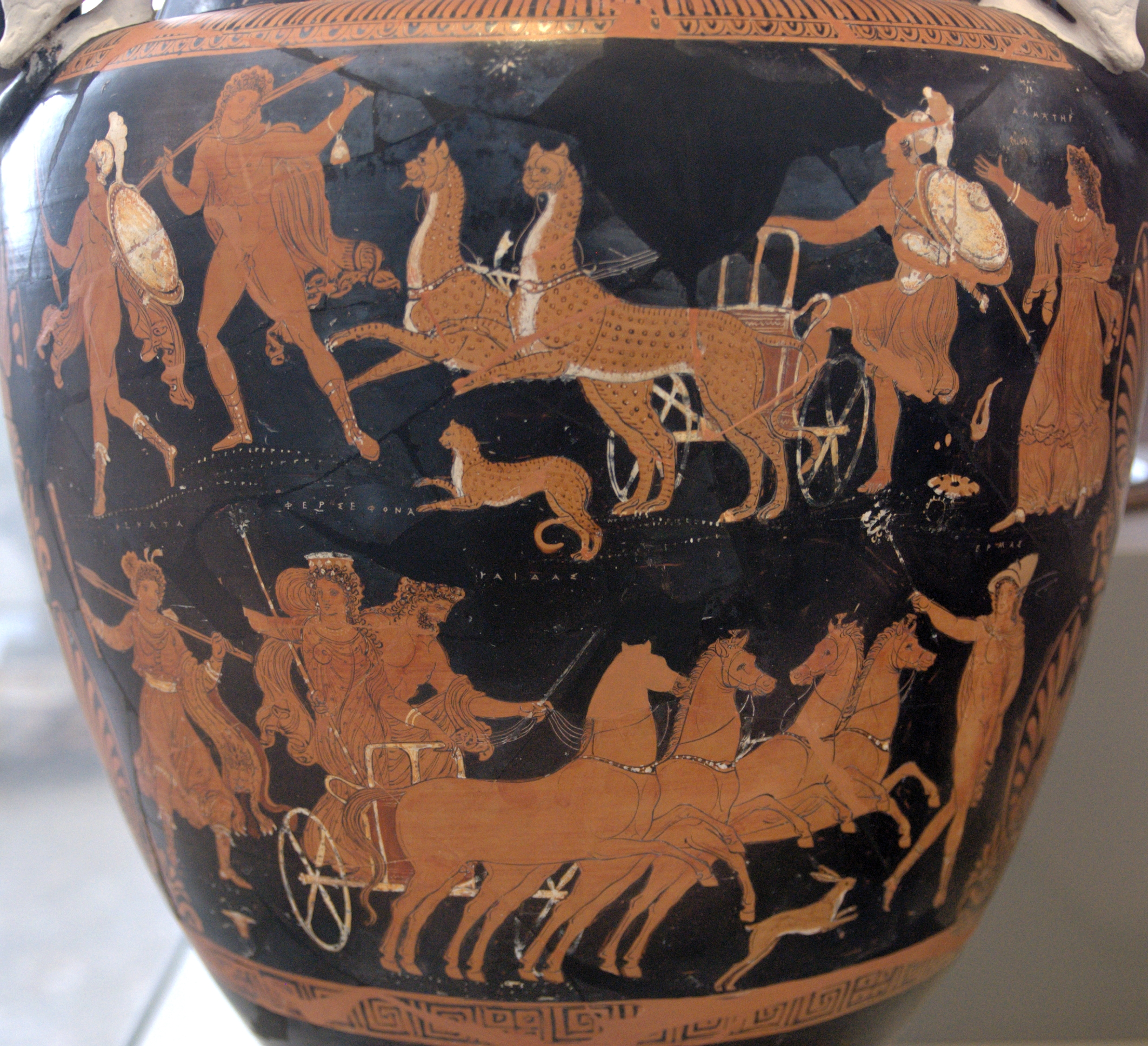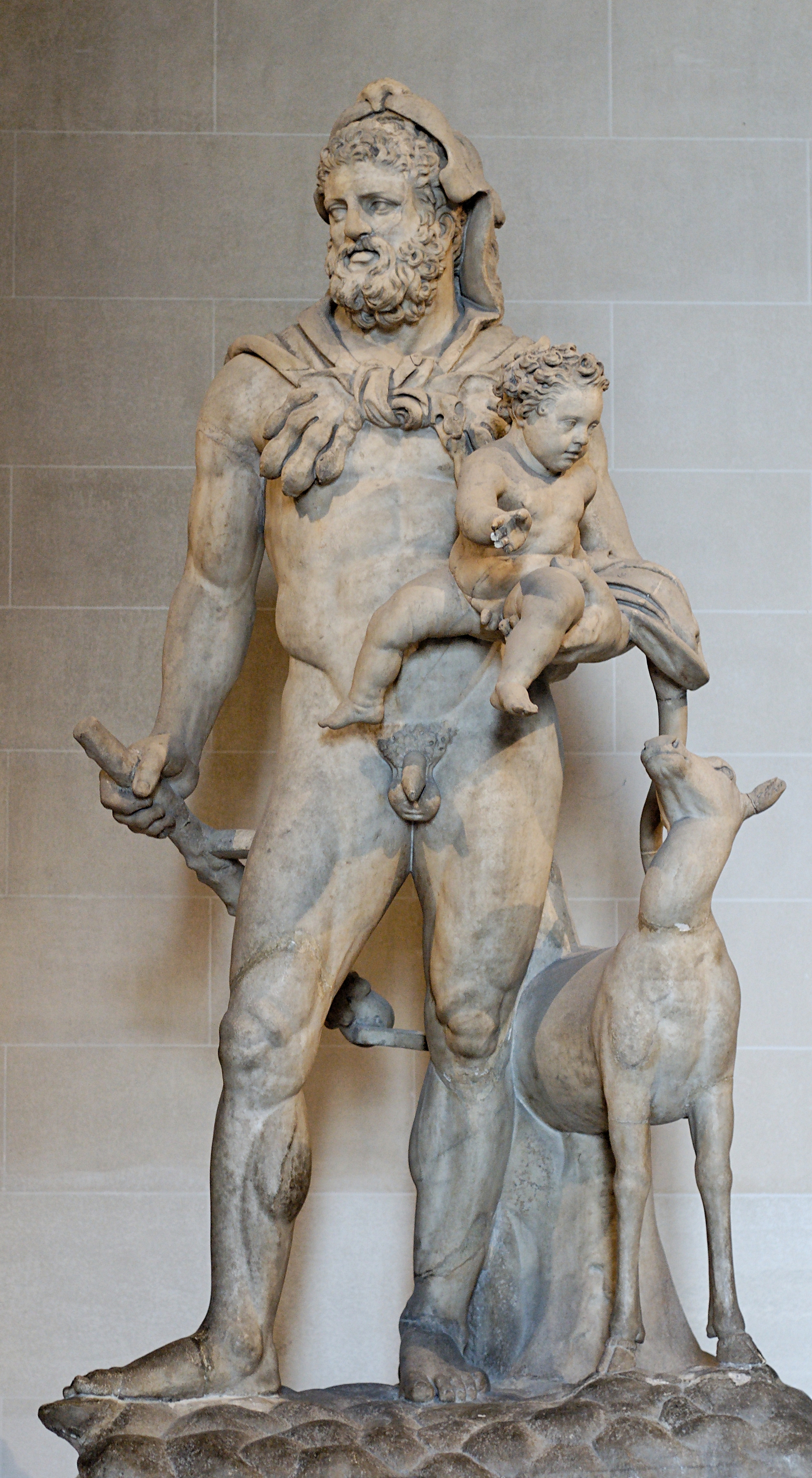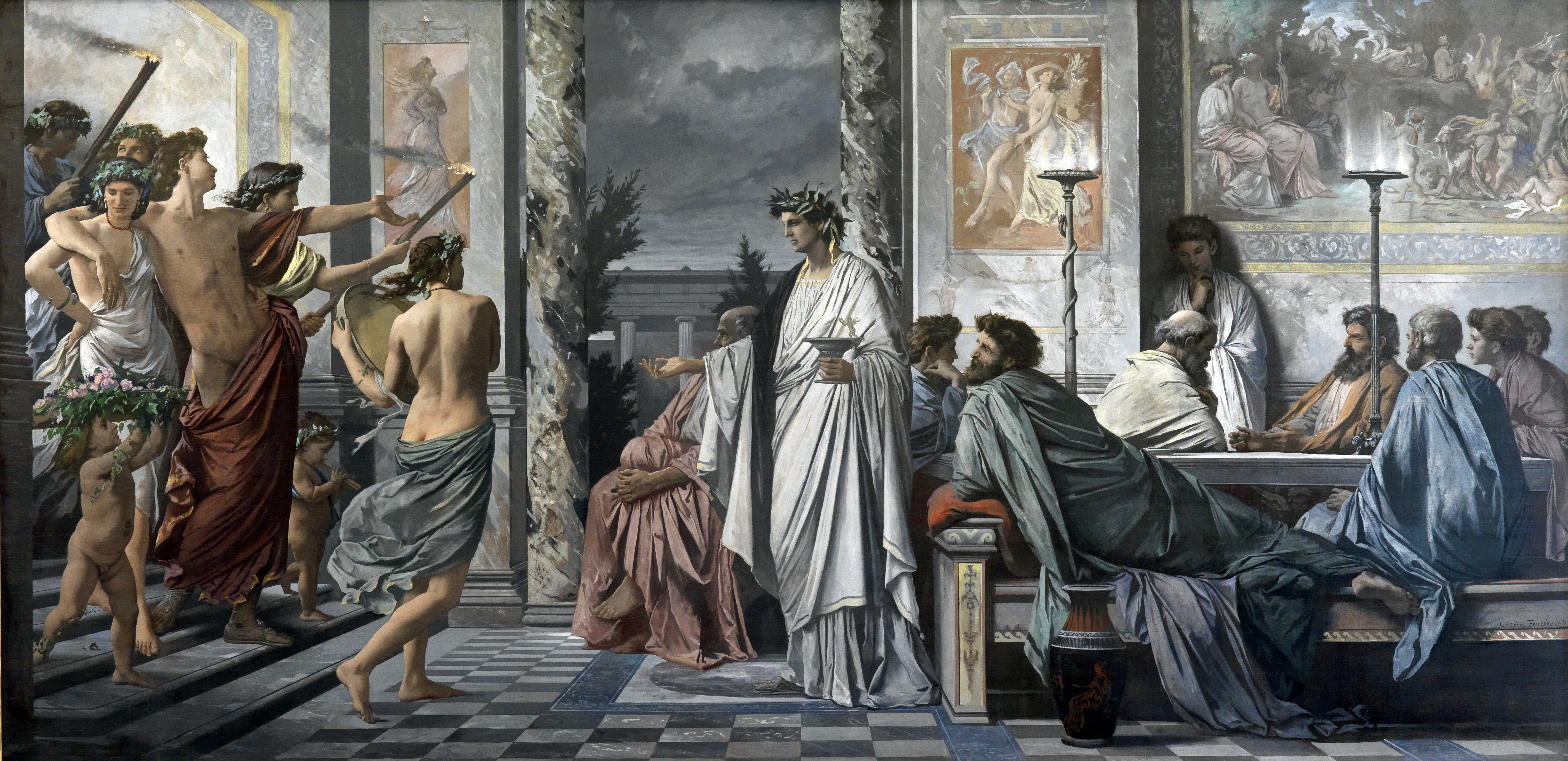|
Thesmophoriazusae
''Thesmophoriazusae'' (; ''Thesmophoriazousai'', ), or ''Women at the Thesmophoria'' (sometimes also called ''The Poet and the Women''), is one of eleven surviving comedy plays by Aristophanes. It was first produced in 411 BC, probably at the City Dionysia. The play's focuses include the subversive role of women in a male-dominated society; the vanity of contemporary poets, such as the tragic playwrights Euripides and Agathon; and the shameless, enterprising vulgarity of an ordinary Athenian, as represented in this play by the protagonist, Mnesilochus. The work is also notable for Aristophanes' free adaptation of key structural elements of Old Comedy and for the absence of the anti-populist and anti-war comments that pepper his earlier work. It was produced in the same year as ''Lysistrata'', another play with sexual themes. How ''Thesmophoriazusae'' fared in the City Dionysia drama competition is unknown, but the play has been considered one of Aristophanes' most brilliant parodi ... [...More Info...] [...Related Items...] OR: [Wikipedia] [Google] [Baidu] |
The Acharnians
''The Acharnians'' or ''Acharnians'' (Ancient Greek: ''Akharneîs''; Attic: ) is the third play — and the earliest of the eleven surviving plays — by the Athenian playwright Aristophanes. It was produced in 425 BC on behalf of the young dramatist by an associate, Callistratus, and it won first place at the Lenaia festival. ''The Acharnians'' is about an Athenian citizen, Dikaiopolis, who miraculously obtains a private peace treaty with the Spartans and enjoys the benefits of peace in spite of opposition from some of his fellow Athenians. The play is notable for its absurd humour, its imaginative appeal for an end to the Peloponnesian War, and for the author's spirited response to condemnations of his previous play, ''The Babylonians'', by politicians such as Cleon, who had reviled it as a slander against the Athenian polis. In ''The Acharnians'', Aristophanes reveals his resolve not to yield to attempts at political intimidation. Along with the other surviving plays of Aris ... [...More Info...] [...Related Items...] OR: [Wikipedia] [Google] [Baidu] |
Aristophanes
Aristophanes (; ; ) was an Ancient Greece, Ancient Greek Ancient Greek comedy, comic playwright from Classical Athens, Athens. He wrote in total forty plays, of which eleven survive virtually complete today. The majority of his surviving plays belong to the genre of comic drama known as Old Comedy and are considered its most valuable examples. Aristophanes' plays were performed at the religious festivals of Athens, mostly the City Dionysia and the Lenaia, and several of them won the first prize in their respective competitions. Also known as "The Father of Comedy" and "the Prince of Ancient Comedy", Aristophanes wrote plays that often dealt with real-life figures, including Euripides and Alcibiades, and contemporary events, such as the Peloponnesian War. He has been said to recreate the life of ancient Athens more convincingly than any other author. His plays are characterized by preposterous premises, explicit language, wordplays, and political satire. His powers of ridicule ... [...More Info...] [...Related Items...] OR: [Wikipedia] [Google] [Baidu] |
Lysistrata
''Lysistrata'' ( or ; Attic Greek: , ''Lysistrátē'', ) is an ancient Greek comedy by Aristophanes, originally performed in classical Athens in 411 BC. It is a comic account of a woman's mission to end the Peloponnesian War between Greek city states by denying all the men of the land any sex, which was said to be the only thing they truly and deeply desired. Lysistrata persuades the women of the warring cities to engage in a sex strike as a means of forcing the men to negotiate peace – a strategy that inflames the battle between the sexes. The play is notable for being an early exposé of sexual relations in a male-dominated society. Its structure represents a shift from the conventions of Old Comedy, a trend typical of the author's career. It was produced in the same year as the '' Thesmophoriazusae'', another play with a focus on gender-based issues, just two years after Athens's defeat in the Sicilian Expedition. Plot The play begins with these lines spoken by ... [...More Info...] [...Related Items...] OR: [Wikipedia] [Google] [Baidu] |
Euripides
Euripides () was a Greek tragedy, tragedian of classical Athens. Along with Aeschylus and Sophocles, he is one of the three ancient Greek tragedians for whom any plays have survived in full. Some ancient scholars attributed ninety-five plays to him, but the ''Suda'' says it was ninety-two at most. Of these, eighteen or nineteen have survived more or less complete (''Rhesus (play), Rhesus'' is suspect). There are many fragments (some substantial) of most of his other plays. More of his plays have survived intact than those of Aeschylus and Sophocles together, partly because his popularity grew as theirs declinedMoses Hadas, ''Ten Plays by Euripides'', Bantam Classic (2006), Introduction, p. ixhe became, in the Hellenistic Age, a cornerstone of ancient literary education, along with Homer, Demosthenes, and Menander.L.P.E.Parker, ''Euripides: Alcestis'', Oxford University Press (2007), Introduction p. lx Euripides is identified with theatrical innovations that have profoundly influ ... [...More Info...] [...Related Items...] OR: [Wikipedia] [Google] [Baidu] |
Cleisthenes (son Of Sibyrtius)
Cleisthenes ( ; ), also Clisthenes or Kleisthenes, was a prominent Athenian delegate ('' theoros'') during the Peloponnesian War (431 BC). The comedian Aristophanes used him frequently as the butt of jokes and as a character in his plays, ridiculing him for being effeminate and/or passive homosexual ('' kinaidos''). He is notably mentioned in ''The Frogs'', '' The Clouds'', ''Lysistrata ''Lysistrata'' ( or ; Attic Greek: , ''Lysistrátē'', ) is an ancient Greek comedy by Aristophanes, originally performed in classical Athens in 411 BC. It is a comic account of a woman's mission to end the Peloponnesian War between Greek city ...'', and '' Thesmophoriazusae''. References *'' Acharnians'' 117,'' The Clouds'', 354,'' Thesmophoriazusae'', 574. * {{authority control 5th-century BC Athenians 5th-century BC Greek politicians Ancient Greek LGBTQ people Aristophanes Athenians of the Peloponnesian War ... [...More Info...] [...Related Items...] OR: [Wikipedia] [Google] [Baidu] |
Thesmophoria
The Thesmophoria () was an ancient Greek religious festival, held in honor of the goddess Demeter and her daughter Persephone. It was held annually, mostly around the time that seeds were sown in late autumn – though in some places it was associated with the harvest instead – and celebrated human and agricultural fertility. The festival was one of the most widely celebrated in the Greek world. It was restricted to adult women, and the rites practiced during the festival were kept secret. The most extensive sources on the festival are a comment in a scholion on Lucian, explaining the festival, and Aristophanes' play '' Thesmophoriazusae'', which parodies the festival. Festival The Thesmophoria was one of the most widespread ancient Greek festivals. The fact that it was celebrated across the Greek world suggests that it dates back to before the Greek settlement in Ionia in the eleventh century BCE. The best evidence for the Thesmophoria concern its practice in Athens, but ... [...More Info...] [...Related Items...] OR: [Wikipedia] [Google] [Baidu] |
Andromeda (play)
''Andromeda'' (, ''Androméda'') is a lost tragedy written by Euripides, based on the myth of Andromeda (mythology), Andromeda and first produced in 412 BC, in a trilogy that also included Euripides' ''Helen (play), Helen''. ''Andromeda'' may have been the first depiction on stage of a young man falling in love with a woman. The play has been lost; however, a number of fragments are extant. In addition, a number of ancient sources refer to the play, including several references in plays by Aristophanes. Plot Several aspects of the plot of ''Andromeda'' can be inferred from the extant fragments and references. The play opened with Andromeda (mythology), Andromeda alone on stage, having been chained to a rock near the sea and near a cave by her father Cepheus, King of Aethiopia, to be eaten by a sea monster. This was to mollify the sea god Poseidon after either Cepheus or his wife Cassiopeia (Queen of Aethiopia), Cassiopeia had offended the god. Andromeda laments her fate alone ... [...More Info...] [...Related Items...] OR: [Wikipedia] [Google] [Baidu] |
Telephus
In Greek mythology, Telephus (; , ''Tēlephos'', "far-shining") was the son of Heracles and Auge, who was the daughter of king Aleus of Tegea. He was adopted by Teuthras, the king of Mysia, in Asia Minor, whom he succeeded as king. Telephus was wounded by Achilles when the Achaeans (Homer), Achaeans came to his kingdom on their way to sack Troy and bring Helen of Troy, Helen back to Sparta, and later healed by Achilles. He was the father of Eurypylus (son of Telephus), Eurypylus, who fought alongside the Troy, Trojans against the Greeks in the Trojan War. Telephus' story was popular in ancient Greek and Roman iconography and tragedy. Telephus' name and mythology were possibly derived from the Hittites, Hittite god Telipinu (mythology), Telepinu. Birth to adulthood Summary Telephus' mother was Auge, the daughter of Aleus, the king of Tegea, a city in Arcadia (ancient region), Arcadia, in the Peloponnese of mainland Greece. His father was Heracles, who had seduced or raped Auge, ... [...More Info...] [...Related Items...] OR: [Wikipedia] [Google] [Baidu] |
Old Comedy
Old Comedy is the first period of the ancient Greek comedy, according to the canonical division by the Alexandrian grammarians.Mastromarco (1994) p.12 The most important Old Comic playwright is Aristophanes – whose works, with their daring political commentary and abundance of sexual innuendo, ''de facto'' define the genre. The only extant plays of Old Comedy are credited to Aristophanes. There are only fragments and 'testimonia' of all other Old Comedy playwrights and plays. Origins and history The word "comedy" (, ''kōmōidía'') derives from the words for 'revel' and 'song' ( κῶμος, ''kōmos'', and ᾠδή, ''ōidē'') and according to Aristotle comic drama actually developed from song. The first official comedy at the City Dionysia was not staged until 487/6 BCE, by which time tragedy had already been long established there. The first comedy at the Lenaia was staged later still, only about 20 years before the performance there of ''The Acharnians'', the first of A ... [...More Info...] [...Related Items...] OR: [Wikipedia] [Google] [Baidu] |
Echo (mythology)
In Greek mythology, Echo (; , ''Ēkhō'', "echo", from ἦχος (''ēchos''), "sound") was an Oread who resided on Cithaeron, Mount Cithaeron. Zeus loved consorting with beautiful nymphs and often visited them on Earth. Eventually, Zeus's wife, Hera, became suspicious, and came from Mount Olympus in an attempt to catch Zeus with the nymphs. Echo, by trying to protect Zeus (as he had ordered her to do), endured Hera's wrath, and Hera made her only able to speak the last words spoken to her. So when Echo met Narcissus (mythology), Narcissus and fell in love with him, she was unable to tell him how she felt and was forced to watch him as he fell in love with himself. Classical depiction ''Metamorphoses'' In ''Metamorphoses'' (8 AD), the poet Ovid tells of Juno (mythology), Juno (Hera in Greek mythology) and the jealousy she felt over her husband Jupiter (mythology), Jupiter's (Zeus in Greek mythology) many affairs. Though vigilant, whenever she was about to catch him, Echo distra ... [...More Info...] [...Related Items...] OR: [Wikipedia] [Google] [Baidu] |
Agathon
Agathon (; ; ) was an Athenian tragic poet whose works have been lost. He is best known for his appearance in Plato's '' Symposium,'' which describes the banquet given to celebrate his obtaining a prize for his first tragedy at the Lenaia in 416. He is also a prominent character in Aristophanes' comedy the '' Thesmophoriazusae''. Life and career Agathon was the son of Tisamenus, and the lover of Pausanias, with whom he appears in both the ''Symposium'' and Plato's '' Protagoras''. Together with Pausanias, around 407 BC he moved to the court of Archelaus, king of Macedon, who was recruiting playwrights; it is here that he probably died around 401 BC. Agathon introduced certain innovations into the Greek theater: Aristotle tells us in the '' Poetics'' (1451b21) that the characters and plot of his '' Anthos'' were original and not, following Athenian dramatic orthodoxy, borrowed from mythological or historical subjects. Agathon was also the first playwright to write choral pa ... [...More Info...] [...Related Items...] OR: [Wikipedia] [Google] [Baidu] |
Andromeda (mythology)
In Greek mythology, Andromeda (; or ) is the daughter of Cepheus (father of Andromeda), Cepheus, the king of Aethiopia, and his wife, Cassiopeia (mother of Andromeda), Cassiopeia. When Cassiopeia boasts that she (or Andromeda) is more beautiful than the Nereids, Poseidon sends the sea monster Cetus (mythology), Cetus to ravage the coast of Aethiopia as divine punishment. Queen Cassiopeia (mother of Andromeda), Cassiopeia understands that chaining Andromeda to a rock as a human sacrifice is what will appease Poseidon. Perseus finds her as he is coming back from his quest to decapitate Medusa, and brings her back to Greece to marry her and let her reign as his queen. With the head of Medusa, Perseus Petrifaction in mythology and fiction, petrifies Cetus to stop it from terrorizing the coast any longer. As a subject, Andromeda has been popular in art since classical antiquity; rescued by a Greek hero cult, Greek hero, Andromeda's narration is considered the forerunner to the "pr ... [...More Info...] [...Related Items...] OR: [Wikipedia] [Google] [Baidu] |






